|
|
|
Sort Order |
|
|
|
Items / Page
|
|
|
|
|
|
|
| Srl | Item |
| 1 |
ID:
187080
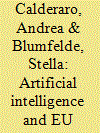

|
|
|
|
|
| Summary/Abstract |
EU Digital Sovereignty has emerged as a priority for the EU Cyber Agenda to build free and safe, yet resilient cyberspace. In a traditional regulatory fashion, the EU has therefore sought to gain more control over third country-based digital intermediaries through legislative solutions regulating its internal market. Although potentially effective in shielding EU citizens from data exploitation by internet giants, this protectionist strategy tells us little about the EU’s ability to develop Digital Sovereignty, beyond its capacity to react to the external tech industry. Given the growing hybridisation of warfare, building on the increasing integration of artificial intelligence (AI) in the security domain, leadership in advancing AI-related technology has a significant impact on countries’ defence capacity. By framing AI as the intrinsic functioning of algorithms, data mining and computational capacity, we question what tools the EU could rely on to gain sovereignty in each of these dimensions of AI. By focusing on AI from an EU Foreign Policy perspective, we conclude that contrary to the growing narrative, given the absence of a leading AI industry and a coherent defence strategy, the EU has few tools to become a global leader in advancing standards of AI beyond its regulatory capacity.
|
|
|
|
|
|
|
|
|
|
|
|
|
|
|
|
| 2 |
ID:
187083
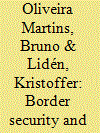

|
|
|
|
|
| Summary/Abstract |
The European Union’s effort at controlling its external borders is an endeavour that increasingly relies on digital systems: from tools for information gathering and surveillance to systems for communicating between different agencies and across member states. This makes EU borders a key site for the politics of “digital sovereignty” – of controlling digital data, software and infrastructures. In this article, we propose a new understanding of how the concepts of digital and sovereignty interplay: sovereignty by digital means, sovereignty of the digital, and sovereignty over the digital. We do it by analysing three key manifestations within the EU’s borderwork: firstly, the expansion of EURODAC to include facial biometric data; secondly, the creation of the (future) shared Biometric Matching System (sBMS); and thirdly, the EU-funded West Africa Police Information System (WAPIS). These databases and systems exemplify three transformations of EU borderwork that invoke different dimensions of digital sovereignty: expansion of techniques for governing migration; interoperability of EU databases facilitating the internalisation of borders through domestic policing; and extra-territorialization of borderwork beyond the geographic limits of the EU.
|
|
|
|
|
|
|
|
|
|
|
|
|
|
|
|
| 3 |
ID:
187081
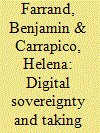

|
|
|
|
|
| Summary/Abstract |
In recent years, we have been able to observe the emergence and mainstreaming of an EU discourse on digital sovereignty, which highlights the importance of gaining back control of EU digital infrastructure and technological production, based on the EU's perceived loss of economic competitiveness, limited capacity to innovate, high degree of dependence on foreign digital infrastructures and service providers and, related to all these factors, difficulty in providing EU citizens with a high level of cybersecurity. Bearing in mind that a considerable percentage of these infrastructures and service providers are under private sector control, the present article asks how this sovereignty discourse conceptualises the role of the private sector in EU cybersecurity. Drawing from a Regulatory Capitalism theoretical model, this article proposes that the EU has instead entered a Regulatory Mercantilist phase where it seeks to reassert its control over cyberspace, impose digital borders, accumulate data wealth and reduce its dependence on external private sector actors whose values may not reflect those of the EU order. A new approach to cybersecurity is emerging, in which the non-EU private sector can be perceived as much of a threat as foreign powers, and from whom digital sovereignty must be secured.
|
|
|
|
|
|
|
|
|
|
|
|
|
|
|
|
| 4 |
ID:
187078
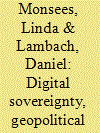

|
|
|
|
|
| Summary/Abstract |
“Digital sovereignty” has emerged as a hot topic in European politics. But although true European digital sovereignty seems unattainable, analysing the digital sovereignty discourse is still useful since it tells us much about European politics. We examine three “projects” which are part of the broader digital sovereignty initiative: 5G, Gaia-X, and the semiconductor industry. This empirical perspective allows for a better understanding of how imaginaries about digital sovereignty play out in these specific tech projects and how these then help to affirm a particular European identity. Methodologically, we focus on how particular geopolitical imaginaries appear in these digital sovereignty projects. Our empirical analysis reveals that Europe’s comparatively weak digital industries are considered a security issue. China and, to a lesser degree, the United States are not only seen as economic rivals but also security threats when it comes to issues such as espionage and data protection. Based on this, we argue that digital sovereignty projects, despite being full of contradictions and tensions, contribute to a distinct EU identity of an agile, future-oriented global player in the digitised economy. This, while not entirely new, is a powerful imaginary even if the proposed idea of “sovereignty” might never be enacted.
|
|
|
|
|
|
|
|
|
|
|
|
|
|
|
|
| 5 |
ID:
187076


|
|
|
|
|
| Summary/Abstract |
The notion of digital sovereignty, also often referred to as technological sovereignty, has been gaining momentum in the European Union’s (EU) political and policy discourses over recent years. Digital sovereignty has come to supplement an already substantial engagement of the EU with the digital across various security policy domains. The goal of this article and of the overall Special Issue is to explore how the discourse and practices of digital sovereignty redefine European security integration. Our core argument is that digital sovereignty has both direct and indirect implications for European security as the EU attempts to develop and control digital infrastructures (sovereignty over the digital), as well as the use of digital tools for European security governance (sovereignty through the digital). It is thus essential to further explore digital sovereignty both in terms of European policies and of a re-articulation of sovereign power and digital technologies – what we suggest calling digital/sovereignty.
|
|
|
|
|
|
|
|
|
|
|
|
|
|
|
|
| 6 |
ID:
187079
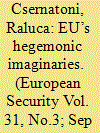

|
|
|
|
|
| Summary/Abstract |
Discourses around “strategic autonomy” and “sovereignty”, traditionally used at the state level, have been recently circulated within the EU supranational context regarding the European defence technological and industrial base, dual-use and disruptive research and innovation, and advances in the tech and digital domains. This article explores whether a high-politics logic intrinsic to “strategic autonomy” and “sovereignty” has been transplanted at the EU-level to enhance the strategic priority of various lower-politics policy fields across tech and digital policy initiatives and instruments. This logic has the hegemonic effect of shaping collective thinking and opening windows of opportunity for EU policymaking, by mainstreaming a security imaginary into broader technological governance processes. The article examines the EU’s scaled-up rhetoric around floating signifiers such as “strategic autonomy” and “technological sovereignty”, as well as the diffusion of overlapping “sovereignty” agendas enacted transversely in the defence, tech and digital sectors. The argument is that their meaning is not yet fixed but articulated via hegemonic interventions across different interconnected policy fields. This makes for conceptual “travelling” and “stretching” with a potential impact on the future of European security integration, by creating of a more unified security imaginary of the EU as a strategically independent and technologically sovereign space.
|
|
|
|
|
|
|
|
|
|
|
|
|
|
|
|
| 7 |
ID:
187082
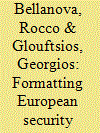

|
|
|
|
|
| Summary/Abstract |
In this article, we explore the security politics of EU database interoperability, inquiring how knowledge infrastructures underpin European security integration. Sitting at the intersection of Science and Technology Studies (STS) and critical approaches to European security, we unpack the co-constitutive relation between database anxieties and interoperability mechanisms. By database anxieties, we refer to what European institutions identify as the main epistemic and operational concerns that emerge from the current use of databases by security authorities across Europe. These anxieties are expected to be resolved by mechanisms that foster interoperability. We argue that the relation between database anxieties and interoperability mechanisms shapes the novel conditions of possibility for European security integration in a datafied world. While far-reaching in technological terms, interoperability is not about introducing a new overarching system, but about the management, re-organisation and re-purposing of datasets. Such formatting matters politically because it eventually informs sovereign acts of policing and mobility control.
|
|
|
|
|
|
|
|
|
|
|
|
|
|
|
|
| 8 |
ID:
187077
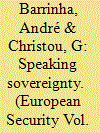

|
|
|
|
|
| Summary/Abstract |
The EU’s revised Cybersecurity Strategy (2020) has been constructed in the context of increasing geopolitical tension and within a dynamically evolving technological environment. The onset of new technologies has brought with it new opportunities but also perceived risks and threats in cyberspace, to which the EU has sought to elicit a more comprehensive approach underpinned by a move to become more “technologically sovereign”. We seek in this article to critically unpack what such claims to technological sovereignty mean for the EU in the cyber domain and what the practical implications are of the EU taking ownership of and performing sovereignty. More specifically, in seeking to conceptually unpack technological sovereignty in its internal and external manifestations, we show how its articulation, legitimisation and operationalisation has implications and consequences for the EU’s identity and action in the cyber domain.
|
|
|
|
|
|
|
|
|
|
|
|
|
|
|
|
|
|
|
|
|